- People
- Matt Bai
- Cassandra Butts
- David Axelrod
- Janny Scott
- Debra Dickerson
- Roger Wilkins
- David Mendell
- Matthew Dowd
- Related Links
- The March '08 Speech: A More Perfect Union
Watch and/or read the text of the speech. - What Politicians Say When They Talk About Race
A New York Times article published around the time of the controversy. - Is Obama the End of Black Politics?
This question is posed to help understand why, in this presidential election, "a lot of the old activists stood in the path of an African American's advancement rather than blazing it." (The New York Times, Aug. 6, 2008) - A Biracial Candidate Walks His Own Fine Line
"Like others of his generation, he is a member of a new class of black politicians." (The New York Times, Dec. 29, 2007)
Matt Bai The New York Times Magazine; author, The Argument
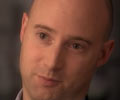
Obviously, there's a sense among a lot of people in Democratic politics that the media overhyped the Wright affair, and a lot of people in the media think so, too. I never covered the Wright affair in any particular way in print, but I don't think it was overhyped. I think it was actually quite significant.
It was significant for a couple reasons. It's very significant in a racial sense, because, of all the barriers that remain to a black candidate in America is the sense that black Americans look askance at the American establishment, at white America. The sense that you're hated, the sense that there's a resentment there.
And what Wright did was to cast that cloud over Obama, was to say: "Huh! Maybe this is a guy who thinks America is a fundamentally unfair country. Maybe this is a guy who thinks white Americans get away with something." And that's something that scares white voters. You saw it in the numbers after that controversy arose. A lot of white voters deserted him in states where he should have been more competitive. …
The whole thing cumulatively undermines this core selling point that he has. [It] makes people wonder, is he really a unifier? Is he really a guy who's beyond divisions, or does he harbor the same resentments that everybody else does? And any time revelations or controversies undermine your core message, the central premise of your argument, you're in some political trouble. …
Cassandra Butts Harvard Law, class of '91; Obama adviser
 Read the full interview >
Read the full interview >
Republicans were trying to find some way to caricature Barack. They hadn't been able to find anything prior to the Wright controversy. And they successfully used the sound bites from a number of different sermons to caricature Barack, through the reverend, as someone with fringe ideas that were not consistent with the values of the majority of the electorate. And they certainly had some success in doing that. …
How does Barack respond when this happens?
I think that Barack saw it as comments that had been taken out of context. He had been a member of the church for a number of years, had heard a number of Wright's sermons, appreciated the wholeness of Wright's contribution to Trinity [United Church of Christ] and to the community. …
It was very important for Barack to put Wright into context, and why his comments were being used the way they were, to stoke fears and concerns about race. And what's a historical context for that. And so Barack decided that he wanted to do the race speech. …
There were a number of his advisers who thought that that was not the right thing to do. But he was convinced that it was a moment where he could go beyond the Wright issue, address issues of race that had been an undercurrent of the campaign.
I'd seen a copy of the speech beforehand. But in watching the speech, I was moved to tears. It was just profound. It was just so Barack. It was everything that I believed, and I think people who've known him believed, that he would bring to the race. Not just the politician who could transcend race, but a politician who would not shy away from addressing race. …
David Axelrod Chief strategist, Obama campaign
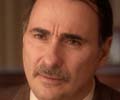 Read the full interview >
Read the full interview >
The Wright episode was one of those episodes in which I began to see a president in real stark terms. …
[Obama] had mentioned the desire to make a speech like this before, but this seemed like the right time. And he said, "And I want to do it on Monday or Tuesday. But I have to write it."
So he went off campaigning on Saturday and came home. At 9:30 Saturday night, he dictated an outline to one of his speechwriters who shot it back to him on Sunday. Sunday night at ten, he started working on it again, and worked until three in the morning. We took off at eight in the morning the next day, on Monday. The speech was Tuesday. Campaigned all day in Pennsylvania, and then from 9:30 till 2:00 in the morning on Monday, he finished the speech.
Knowing his habits, I just went to sleep, thinking I'd wake up in the middle of the night because the speech would be there in the middle of the night. And that's what happened. And I read that speech and I just emailed him back and said, "This is why you should be president," because it was so filled with wisdom, so profound in many ways that it just blew me away that a guy in the midst of all this chaos, with no sleep and in the middle of the night, could produce that kind of thought and that kind of work. …
Janny Scott The New York Times
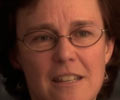
He then gives this really quite unprecedented speech, or unprecedented within the last 40 years, a phenomenon of a presidential candidate speaking very bluntly and directly to the country about race from the perspective of not just African Americans, but the perspective of white people and what happens. The anxieties and fears of each play out in the relationship with the other group. …
Historians say that it was really quite extraordinary. That really not since Lyndon Johnson's speeches in 1965 has a president or potential nominee addressed the subject of race so frankly. …
The term "a national conversation on race," he didn't actually ask for that. For some reason that was interpreted as that. What he seemed to be saying was, "If we allow race to continue to bifurcate our politics, we will never be able to tackle these topics, these issues, that you all are asking to be addressed -- health care, education, all of these domestic issues, inequality -- because race is constantly being used as a wedge to prevent the kind of coalition that you really need to take these things on."
I take the speech not so much as a plea that everybody stop talking to each other about race, but that they recognize the subtle and insidious ways that race has been used to divide people politically, and finally liberate themselves to move beyond that. ...
He does what legal scholars say is a rather remarkable thing of tracing the history of race straight back to the Constitution, to the protections in the negotiation of the Constitution, the protections left for slavery and racism. So he traces our complex history of race right back to the founding of the country and the Constitution and yet, remarkably, continues to bring forward and speak about this with great hope and optimism. The possibility that in the process of creating a more perfect union, that we could move beyond this thing that has hung up our politics for so long.
He then talks about how race is experienced by African Americans, as well as how it is experienced by whites. The resentment of African Americans and bitterness about their historical experience, and particularly the experience of generations such as that of Wright. But also acknowledging, on the other hand, the anxieties and anger of whites who feel that they've seen African Americans receive favored treatment in the form of affirmative action, who feel that they've seen their neighborhoods decline as a result of crime or whatever.
So it was a very interesting speech coming from an African American politician in that it was not a speech that white people took to be about victimization. A lot of people were able to see it as a serious attempt to grapple with both sides and bring them together…
Debra Dickerson Author, The End of Blackness
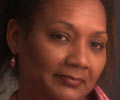
I grew up a southern Baptist holy roller, you know, that whole speaking in tongues thing. And I have always been amazed by the things that I hear in church. And I think, huh, if America ever starts listening to this stuff, we're in a world of hurt. …That kind of thing that [Wright] says gets said in pulpits all across America every Sunday. …
When you know something about their prophetic tradition of which Sojourner Truth was a part and Frederick Douglass and certainly Dr. King … some of the things Dr. King said are right up there with some of the things that Jeremiah Wright is saying. So we've all got a lot to learn. But it's very easy to reduce that down to sound bites, taken out of context. But it's amazing to me that it's taken this long.
Barack Obama's not dumb. And he sat up in church Sunday after Sunday and heard those things and he didn't think that that would be connected to him. But those days are over. … Religiosity has always gotten a pass. They're very, very, very involved in politics, but they've always gotten a pass on the content of their theology. That's not going to be happening anymore. …
Roger Wilkins Professor, George Mason University
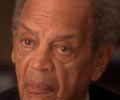
Very few white Americans have ever been in a black house of worship. It's still true that the most segregated time in America is 11:00 on Sunday morning. …
The other part of it is that they had no frame of reference for who Wright was, and how frequently he made these comments in sermons. What they didn't know, for example, is something I know from having done a documentary on that church before Barack Obama got there, but it was about what can religion do, black churches, do to alleviate the conditions in which the black urban poor live. …
Wright was a man who really cared about the poor people in his community. He had a social ministry that was active and powerful and real and it reached out to the children and the poor people, it fed the hungry, it just was fabulous. And it's a big, powerful institution on the South Side of Chicago, one to which people with the intellect and the values of the Obamas would be drawn to.
The day before I knew anything about these utterances, if you'd asked me, "What do you think of Wright," I would have said: "Oh, I think he's fabulous. I think he's exactly the kind of community leader we need." I was appalled. But if I was appalled, of course people, white people, who had no sense of this guy at all, and they would say: "That's not rational. Why would Obama go to a church like that?"
Now, so once that was there, it was like, you know, great baseball pitchers throw fastballs that go about 98 miles an hour. It's like throwing a ball to Alex Rodriguez that is straight and goes about 70 miles an hour, he's going to knock that right out of the park. Well, that's a 70-mile-an-hour fastball for Obama's political rivals. And they dug it out and they used it and they replayed and replayed and replayed. … What people saw in those things was maybe 1 percent of Jeremiah Wright, and the other 99 percent, which is the really good stuff, they had no notion about. …
David Mendell Author, Obama: From Promise to Power
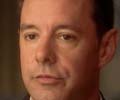 Read the full interview >
Read the full interview >
Obama, I think, felt he could learn a lot from Wright. When he was working on the South Side, he was still trying to really get a feel for African American culture, particularly working-class African American culture. He had been around a lot of blacks who were middle-class or well-heeled, but he had not been dropped into the projects until he got to Chicago. And Rev. Wright could school him in the lives of working-class African Americans, and in just how important the church and scripture is in the lives of working-class African Americans on the South Side of Chicago.
He knew the politics of the South Side very well. The ministers on the South Side, especially back then, were sort of in control of their communities, more so than the aldermen, more so than other politicians. The ministers are the ones who have various congregations, and they decide what politician's going to come in to speak in their church. ...
I think Obama was attracted to Rev. Wright on an intellectual level. Here was someone who was very well-educated and very well-read, and they could connect on that level. He also was a very dynamic speaker. Obama was still trying to learn how to communicate to a black crowd at that point, and Wright was influential in that. Wright had some political connections with the city. So all of these things lead Obama to Rev. Wright, and Rev. Wright was not shy about embracing this intellectual, charismatic young man. …
The perception of Trinity United Church of Christ on the South Side is, very much is, for the well-heeled professional black class. And you certainly see a lot of white-collar blacks attending services there, but there are a fair number of poor folks, too. It's in a part of town that is very impoverished.
It's much more open-minded and liberal than your typical African American church. Rev. Wright, uniquely, had a lot of gays and lesbians attend his church, and he set up a ministry for gays and lesbians. ... You would actually see more white people in that black church than any other black church on the South Side of Chicago, because gays and lesbians would bring their significant others, and there were just a few white people who were attracted to that church. …
I think this multicultural aspect of that church, as well as Rev. Wright's intellectualism, are the things that really appealed to Obama when he was seeking a church. …
Matthew Dowd Political consultant; co-author, Applebee's America; chief strategist, Bush re-election campaign
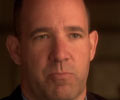
There were some lines in that speech where he basically started to speak to the fears of the middle class. And I think that was probably the most important part, ultimately, of the speech he gave -- less about distinct remarks about Rev. Wright, and more about "I understand middle America, and I understand what you're going through." …